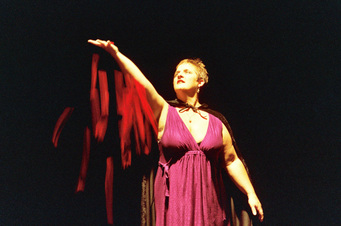Dancing in Idyll-Logical Spaces and Presence-ing Absences:
A Critical Analysis of two Performance Festivals in Itacaré, Bahia, Brazil utilizing Santos’s Sociology of Absences as a critical lens
Laurelann Porter
Abstract
In this essay, I will utilize Boaventura de Sousa e Santos's sociology of absences as a theoretical lens to help illuminate the contexts in which two performances occurred: the third Festival de Dança de Itacaré and the Festival Quilombola de Itacaré. Both festivals occurred in the rural fishing community and tourist haven of Itacaré in rural Bahia, Brazil. The dance festival consisted of performances, workshops, lectures, and a series of outreach and public street performance interventions called “Cidade Fantasia.” The Festival Quilombola de Itacaré was the first of its kind and provided an avenue for members of the five Quilombo communities in Itacaré to gather for an encounter of community dialogue, performances, artisan marketplace exchanges and traditional cuisine.
As part of this analysis I will highlight the potential and possibilities of other modes of existing outside of Global North paradigms. Santos asks scholar-activists to resist the urge to lead acts of social resistance with the kind of false clairvoyance that results in prescriptive solutions imposed from outside the setting. Instead, he encourages scholar-activists to engage in committed witnessing. Santos situates this committed witnessing amid a strategy for engaging with theoretical work and the work of social movements as a means of articulating connections between movements, groups and ideas. I interpret this committed witnessing as an ethical act of care and collaboration between myself as spectator and the various individuals and entities engaged in the production of these arts and cultural festivals. I see this work as an attempt to understand and describe how subtle acts of resistance are already occurring in the site being studied. This analysis serves as an act of committed witnessing.
In this essay, I will utilize Boaventura de Sousa e Santos's sociology of absences as a theoretical lens to help illuminate the contexts in which two performances occurred: the third Festival de Dança de Itacaré and the Festival Quilombola de Itacaré. Both festivals occurred in the rural fishing community and tourist haven of Itacaré in rural Bahia, Brazil. The dance festival consisted of performances, workshops, lectures, and a series of outreach and public street performance interventions called “Cidade Fantasia.” The Festival Quilombola de Itacaré was the first of its kind and provided an avenue for members of the five Quilombo communities in Itacaré to gather for an encounter of community dialogue, performances, artisan marketplace exchanges and traditional cuisine.
As part of this analysis I will highlight the potential and possibilities of other modes of existing outside of Global North paradigms. Santos asks scholar-activists to resist the urge to lead acts of social resistance with the kind of false clairvoyance that results in prescriptive solutions imposed from outside the setting. Instead, he encourages scholar-activists to engage in committed witnessing. Santos situates this committed witnessing amid a strategy for engaging with theoretical work and the work of social movements as a means of articulating connections between movements, groups and ideas. I interpret this committed witnessing as an ethical act of care and collaboration between myself as spectator and the various individuals and entities engaged in the production of these arts and cultural festivals. I see this work as an attempt to understand and describe how subtle acts of resistance are already occurring in the site being studied. This analysis serves as an act of committed witnessing.
| etudesmay2016porter.pdf | |
| File Size: | 1486 kb |
| File Type: | |


